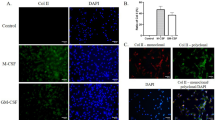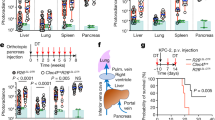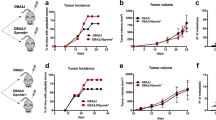Abstract
Cells from a C57BL/cbi chemically induced fibrosarcoma (FS6) require exogenous platelet-derived growth factor (PDGF) for in vitro proliferation (as do normal "untransformed" fibroblasts) whereas cells obtained from the FS6M1 tumour, a spontaneous metastasizing subline, show autonomy from PDGF in vitro. Furthermore, the FS6 cells exhibit very low colony formation in an anchorage-independent growth assay. in vivo, this tumour is immunogenic, rarely metastasizes and is heavily infiltrated by host macrophages. Studies of in vitro cell proliferation and anchorage-independent growth show that syngeneic host macrophages from the peritoneal cavity or from the growing tumour release a diffusible factor(s) which has (1) growth-stimulating activity on FS6 cells in monolayer cultures in PDGF-poor medium and (2) potent colony-stimulating activity on FS6 cell cultured in methyl-cellulose-containing medium. These macrophage supernatants stimulate proliferation of quiescent normal fibroblasts in monolayer culture as well as FS6 sarcoma cells, but do not stimulate anchorage-independent growth of normal cells. Supernatants from BCG-elicited macrophages were shown to contain abundant arginase, and were cytolytic to FS6 cells but not to normal cells. Heat inactivation abrogated the arginase and cytotoxicity, revealing heat-stable mitogenicity for FS6 cells and normal fibroblasts. The stimulatory effect of macrophages on FS6 sarcoma cells can be mimicked by the addition of the tumour promoter 12-tetradecanoyl-phorbol-13-acetate (TPA) and supports the hypothesis that macrophages could play a significant role in multistage carcinogenesis by providing a source of endogenous promoter.
This is a preview of subscription content, access via your institution
Access options
Subscribe to this journal
Receive 24 print issues and online access
$259.00 per year
only $10.79 per issue
Buy this article
- Purchase on Springer Link
- Instant access to full article PDF
Prices may be subject to local taxes which are calculated during checkout
Similar content being viewed by others
Rights and permissions
About this article
Cite this article
Currie, G. Promotion of fibrosarcoma cell growth by products of syngeneic host macrophages. Br J Cancer 44, 506–513 (1981). https://doi.org/10.1038/bjc.1981.219
Issue Date:
DOI: https://doi.org/10.1038/bjc.1981.219
This article is cited by
-
The chemokine MCP-1 (CCL2) in the host interaction with cancer: a foe or ally?
Cellular & Molecular Immunology (2018)
-
In vitro interactions of murine peritoneal macrophages and sarcoma cells
Virchows Archiv B Cell Pathology Including Molecular Pathology (1986)
-
Macrophage infiltration and tumor progression
Cancer and Metastasis Review (1985)



